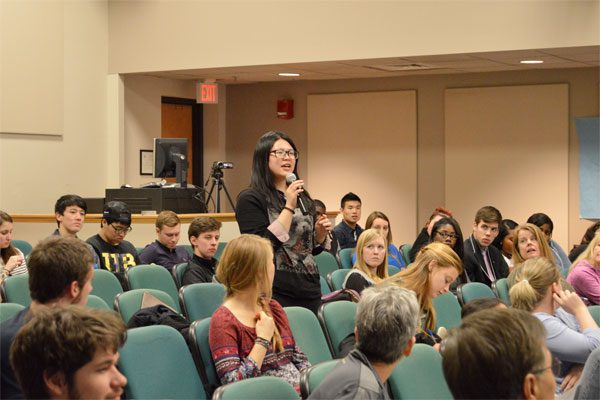Film festival explores the realities of China’s environmental crisis

High on a hillside in southwest China, a handful of elderly residents cry out, pleading for the protection of the mountains, trees, and streams around them.
For many generations, protecting their environment has been a priority for Na ritual specialists who live in the Yunnan and Sichuan provinces of southwest China.
They have no written language. Instead, they chant incantations, beseeching ancestors and the spirits in their biodiverse alpine ecosystem to behave kindly and benevolently. Their traditions are passed down orally through apprentices, but sadly their numbers are dwindling. Fewer than 40 Daba ritual specialists remain, said Onci Archei, a filmmaker and co-founder of the Moso Folk Museum in Yunnan, China.
It’s a little-known story of an advanced environmental consciousness that needs to be heard, said Archei, who traveled to the United States for the first time with museum co-founder and filmmaker Ruheng Duoji to share their original film with Furman students.
The film, Environmental Protection Values in Daba Rituals, was one of eight shown during the University’s first-ever Chinese Environmental Film Festival last month.
The festival was sponsored by The Humanities Development Fund, The David E. Shi Center for Sustainability, the National Committee on United States-China Relations Public Intellectuals Program funded by the Henry Luce and Starr Foundations, Furman’s First Year Seminar Committee, the Asian Studies Department, Environmental Action Group, Furman University Libraries, Film Studies, The Bartram Society, Anthropology, Modern Languages and Literatures, the Biology Department and The Luce Initiative for Asian Studies and the Environment.
Approximately 250 people, a mix of Furman students, faculty, staff, and community members, attended screenings during the three-day festival, which featured experimental, documentary, and feature films with environmental themes, together with expert commentary and question-and-answer sessions following each film.
Films, which ranged from short films of 12 minutes to full-length features, included up close and personal interviews with Chinese families. They discussed the effects of tourism, development, and pollution on families’ ways of life and highlighted little known aspects of Chinese culture.
Filmmakers who participated in the event included: Onci Archei and Ruheng Duoji of Moso Folk Museum, Yunnan, China; Jenny Chio of Emory University; Fuji Lozada and Antonia Giles of Davidson College; Emily Yeh of the University of Colorado-Boulder; and James B. Duke Assistant Professor of Asian Studies Tami Blumenfield of Furman University.
Luce Initiative for Asian Studies and the Environment Faculty Fellows led by James B. Duke Professor of Asian Studies and Political Science Katherine Palmer Kaup and Associate Professor of Earth and Environmental Sciences Wes Dripps and Student Fellows led by Biology Professor and Department Chair Dennis Haney and Associate Director of the Shi Center for Sustainability Yancey Fouché played integral roles by facilitating sessions, providing commentary and assisting behind the scenes.
Teams of students in the First Year Seminar, “Debunking the Myths of China,” researched films and wrote questions for visiting filmmakers. They created a commercial, spearheaded social media publicity, drew a bilingual banner, and organized catering. Students also wrote a journal assessing films they watched, allowing the festival to be integrated into the seminar course.
“This was such a unique opportunity to learn about China and the environment,” said Eric Williams ’18 of Hickory, N.C. “One does not normally get the chance to be enlightened on such specific topics so greatly in such a short period. The experts who attended and spoke made it truly unique.”
Festival organizer Tami Blumenfield said she was delighted with the turnout at the festival. “I am very grateful for the broad group of supporters, students, faculty, and staff who played key roles in the festival,” she said. “People from all over campus and beyond Furman participated, raising some great questions after the screenings. Students even packed the McEachern Lecture Hall on a Saturday morning.”
For a number of students, the documentary, Beijing Besieged by Waste, was their favorite film, a powerful work of art that opened their eyes to a previously unknown problem.
The film, produced by Wang Juliang in 2011, showed Beijing as a city ringed with landfills and surrounded by waste. The city of approximately 21 million people generates more than 30,000 tons of garbage each day. It showed people and flocks of sheep foraging through mountains of trash, dependent on the refuse for their livelihood.
Yilan Lou ’18 of Shanghai attended five different films during the festival. Even as a native of China, he said the films gave him new insight into people and places he’d never been able to see while growing up there.
“Land is very important to people, but many people are silent,” said Lou. “They have no voice. We need to educate people.”
“You could really see how the country is in transition,” said Crystal Brockington ’18 of Conyers, Ga. “The film helped me to see the results of pollution and to understand a different side of things that you don’t always get to see.”
Learn more about the Asian Studies Department at Furman.